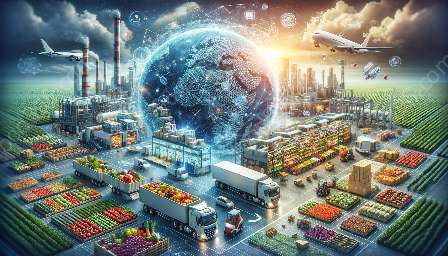As the world's population grows, the demand for food increases, leading to a greater focus on sustainability throughout the food supply chain. This article delves into the significance of sustainability practices in the food supply chain and their impact on food logistics and supply chain management within the food & drink industry.
The Importance of Sustainability in the Food Supply Chain
Sustainability practices in the food supply chain are crucial for ensuring the long-term availability and quality of food while minimizing negative environmental and social impacts. The interconnectedness of the food supply chain, from production to consumption, necessitates sustainable practices to mitigate resource depletion, environmental degradation, and social inequalities.
Sustainable Sourcing and Procurement
One of the foundational elements of sustainable food supply chain management is the sourcing and procurement of raw materials. Sustainable sourcing involves the ethical and environmentally responsible selection of suppliers and the procurement of products with minimal environmental impact. This includes considerations such as fair trade, organic farming, and support for local and small-scale producers.
Energy-Efficient Production and Transportation
Reducing energy consumption and greenhouse gas emissions in food production and transportation is central to sustainable food supply chain practices. Implementing energy-efficient technologies, optimizing transportation routes, and adopting sustainable packaging solutions are key strategies for minimizing the carbon footprint associated with food production and distribution.
Waste Reduction and Circular Economy
Addressing food waste and promoting a circular economy within the supply chain are critical components of sustainable food management. Food loss and waste occur at various stages of the supply chain, from production and distribution to retail and consumption. Implementing measures to reduce waste through improved packaging, storage, and distribution can significantly contribute to sustainability goals.
Impact on Food Logistics and Supply Chain Management
The integration of sustainability practices in the food supply chain has substantial implications for food logistics and supply chain management. Companies are increasingly recognizing the need to reconfigure their supply chain operations to align with sustainability goals. This involves optimizing transportation networks, investing in green logistics, and leveraging technology for enhanced supply chain visibility and transparency.
Collaborative Partnerships and Stakeholder Engagement
Engaging with suppliers, partners, and stakeholders is pivotal in promoting sustainability across the food supply chain. Collaboration facilitates knowledge sharing, innovation, and the implementation of sustainable practices. By establishing partnerships with sustainable suppliers and engaging with stakeholders, food companies can effectively drive positive change throughout the supply chain.
Consumer Awareness and Demand for Sustainable Products
Shifting consumer preferences towards sustainable and ethically produced food products have exerted significant influence on food supply chain management. Consumer demand for transparent and sustainably sourced food items has prompted companies to integrate sustainability into their supply chain strategies, influencing procurement decisions, product labeling, and marketing efforts.
Conclusion
The adoption of sustainability practices in the food supply chain is imperative for addressing environmental, social, and economic challenges while ensuring the resilience and integrity of the food system. By prioritizing sustainable sourcing, reducing waste, and collaborating with stakeholders, food companies can contribute to a more sustainable and resilient food supply chain, thereby positively impacting food logistics and supply chain management within the food & drink industry.

